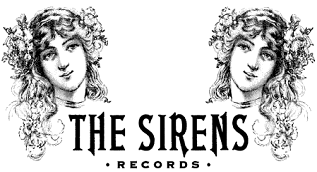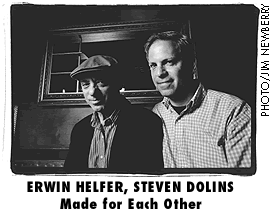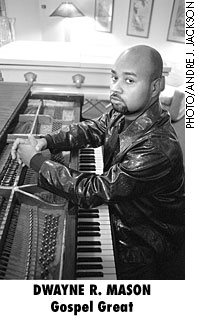The Mission of
The Sirens Records
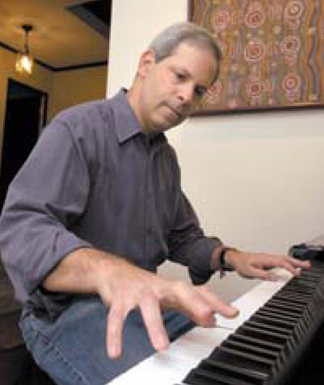
Dr. Steven B. Dolins, the founder
of The Sirens Records
The Sirens Records mission is to preserve authentic Chicago blues, boogie woogie, gospel, and jazz piano music.
We have released compact discs by the best pianists in the world. Some of the legendary blues pianists we've recorded include
Erwin Helfer,
Pinetop Perkins,
Detroit Junior,and
Barrelhouse Chuck.
In gospel music, we've recorded keyboard masters such as
Jessy Dixon,
Geraldine Gay,
Nash Shaffer Jr., and
Reverend Dwayne R. Mason.
In jazz keyboards, we have recorded Earma Thompson, bebop legend, and
Chris Foreman, playing acoustic piano while accompanying Kimberly Gordon.
In addition, we've recorded talented Chicago vocalists including
Katherine Davis (blue and jazz),
Kimberly Gordon (jazz),
Sydne Evans (gospel), and
Donald Gay (gospel).
The Sirens also pays tribute to the master pianists of previous eras including
Sunnyland Slim,
Blind John Davis,
Willie Mabon,
Speckled Red,
Billie Pierce,
and more.
The History of The Sirens Records (in a Collection of Articles)
- Chicago Reader - "Post No Bills"(May 17, 2002)
- Wall Street Journal Article - "Bards Who Keep A Tradition Alive"(January 8, 2003)
- Pioneer Press - "Preaching the gospel of classic Chicago piano boogie"(June 30, 2005)
- Pioneer Press - "Piano blues key part of concerts"(October 26, 2006)
- Wall Street Journal - "Barrelhouse Chuck Goering Keeps
the Blues Alive"(January 3, 2007)
- ABC 7 News - "An inspirational gospel pianist with a flare for jazz"(February 8, 2007)
- Chicago Reader - "That Old Time Religion"(November 21, 2003)
- Chicago Tribune - "Helfer's boogie-woogie piano style still spilling out, 'totally off the cuff'"(February 29, 2008)
- Earma Thomson Honored(September 16, 2008)
- Chief Executive Philanthropist - Dr. Dolins and The Sirens Records (March 1, 2009)
Chicago Reader - "Post No Bills"
by Peter Margasak May 17, 2002
What Took Him So Long?
The shoestring nature of most independent record labels means they can be
pretty erratic in their release schedules -- the money to put out the next
record often isn't there until the previous one pays for itself. But even that
doesn't adequately explain the 25-year gap between releases for The Sirens
Records, a local indie specializing in Chicago blues and boogie-woogie piano
music.
Steven Dolins, now 45, was a teenager when he started the label with a pair
of releases in the mid-70s, but the third item in his catalog, I'm Not Hungry
but I Like to Eat -- BLUES!, by Chicago boogie-woogie great Erwin Helfer, came
out just last year. "I'm not a businessman," says Dolins. "I
didn't do these things for business reasons, and it's not the reason I'm doing
it now. It was definitely about the music."
His obsession with boogie-woogie piano was sparked by Helfer's performance
at the University of Chicago Folk Festival in the early 70s. Dolins, then a
high school student in Skokie, contacted the pianist and began taking lessons
from him. "I sort of idolized him," he says. Like his idol Dolins
ended up studying at Tulane University in New Orleans, where he spent his spare
time soaking up the sounds of Professor Longhair and James Booker and, through
Helfer's connections, meeting legends like Roosevelt Sykes and Tuts Washington.
He started The Sirens in the summer of 1975, after his freshman year.
He also took a job at Jazz Record Mart, the shop owned by Delmark Records
honcho Bob Koester, with the intention of learning as much as possible about
the music business. His first release, with his high school friend David Goldberg,
was a collection called Primitive Piano, featuring the work of four pianists
-- including Saint Louis bluesman Speckled Red and the New Orleans traditionalist
Billie Pierce -- that Helfer had originally released in 1957 on his own short-lived
label, Tone. Dolins pressed a thousand; he still has a couple hundred in his
closet. The following year, he released Heavy Timbre, recorded in a single
raucous day of piano sessions by some of the city's greatest blues players
-- Willie Mabon, Sunnyland Slim, Jimmy Walker, Blind John Davis, and of course
Helfer. "It was a great record, and I had a great time that day," says
Dolins. His brother Barry (now the coordinator of the Chicago Blues Festival)
helped finance that release, but Goldberg was busy with other things, and without
him Dolins didn't enjoy the work.
"I didn't care for the business aspect of it and I lost interest," he
says. "I was trying to figure out what to do with my life." He earned
his bachelor's degree in physics and a master's in computer science at Tulane,
then moved to Dallas, where he worked in a Texas Instruments research lab and
earned his doctorate at the University of Texas in Arlington. In 1989 he moved
back to the Chicago area, where his future wife, Judy, lived. He taught at
the University of Wisconsin, worked at ACNielsen, and eventually landed at
Hitachi, commuting to the Bay Area to serve as chief researcher in an IT lab.
After he was laid off in April 2000, the company found him a consulting position
in Chicago, but that fall his entire division was eliminated, and he was out
of work.
"That's when I decided, `OK, I'm going to do something that I enjoy,'" says
Dolins. "Plus, Erwin needed to put out a record, so it was partially for
my love of the blues piano and partially because I wanted to give something
back to Erwin."
It had been nearly 15 years since Helfer had released a recording in the U.S.
-- the pianist remains one of the hidden jewels of Chicago music. As a teenager
in the early 50s he'd fallen in love with boogie-woogie and jazz, and like
Dolins he hung around with and learned from his heroes, including ragtime pianist
Glover Compton, boogie-woogie pioneers Estella "Mama" Yancey and
Cripple Clarence Lofton, and sometime Louis Armstrong drummer Baby Dodds. He
went to Tulane ostensibly to study psychology, but admits that he spent most
of his time listening to and playing music. After four years, a growing interest
in Baroque music led him back home to study at the American Conservatory of
Music.
"I thought the music sounded so beautiful that it must've been easy to
play," says Helfer, 66. "I was in for a horrible surprise."In
his first music theory class Helfer drew the tails on some eighth notes the
wrong way. "The teacher burst out laughing and said it looked like the
wind was blowing in the wrong direction." Within two years he'd abandoned
his dream of being a concert pianist and settled on a theory program; he's
earned his living as a piano teacher ever since. Although he's taught at Columbia
College and Roosevelt University, Helfer's primary classroom is his Lincoln
Park living room. Most of his students are beginners, but on his long list
of past clients are local blueswoman Yoko Noge and innovative jazz pianist
Myra Melford.
Helfer has recorded a handful of albums since the early 60s, and over the
years he's played long-term, low-key engagements at spots like Gavroche and
Andy's. At his current regular gig, on Thursday nights at Joe's Be-Bop Cafe & Jazz
Emporium, he's usually ignored by the touristy clientele -- but he says he
doesn't mind because it pleases him just to play music for himself. The inelegantly
titled I'm Not Hungry is a gorgeous mix of boogie-woogie, slow blues, and even
jazz balladry (specifically Duke Ellington's "In a Sentimental Mood");
tenor saxophonist John Brumbach, a frequent collaborator, sits in on four tracks.
This year Dolins has added a few more items to The Sirens' catalog, including
a reissue of Heavy Timbre with previously unreleased bonus tracks and a new
blues-piano summit called 8 Hands on 88 Keys, with Helfer, Detroit Junior,
Pinetop Perkins, and relative newcomer Barrelhouse Chuck, whose newest full-length
the label will release next month. Dolins, who's accepted a teaching job at
Bradley University in Peoria for the fall, says he would love to release recordings
by other blues pianists, but he admits he's chosen to focus on a tradition
that has few expert proponents left. "I just don't know how many more
CDs I'll be able to put out," he says.
Helfer and Barrelhouse Chuck perform Saturdays in May and Fridays in June
at Katerina's, 1920 W. Irving Park; 773-348-7592. Helfer and his Chicago Boogie
Ensemble play every Thursday at Joe's Be-Bop Cafe & Jazz Emporium, Navy
Pier, 600 E. Grand; 312-595-5299.
The Wall Street Journal - "Bards Who Keep A Tradition Alive"
By Nat Hentoff January 8, 2003
Many of the most enduring jazz recordings were produced by enthusiasts who
started their own labels to share their pleasures and discoveries. Among them:
Alfred Lion and Frank Wolff (Blue Note), Milt Gabler (Commodore), Bill Russell
(American Music) and Norman Granz (various labels). Less known is Steven Dolins,
whose The Sirens is devoted to blues and boogie-woogie.
Mr. Dolins, who teaches computer science at Bradley University in Peoria,
Ill., started The Sirens in 1976 when still a teenager. Although the rent parties
where boogie-woogie and other classic blues flourished were in decline in Chicago
by then, Mr. Dolins gathered five keepers of this heritage -- Willie Mabon,
Sunnyland Slim, Jimmy Walker, Blind John Davis and Erwin Helfer -- in "Heavy
Timbre." The set has been reissued with bonus tracks, and like all of
the label's recordings it exemplifies what Bob Dylan told me about the blues
40 years ago: "What made the real blues singers so great is that they
were able to state all the problems they had; but at the same time, they were
standing outside of them, and could look at them. And in that way they had
them beat."
On "Heavy Timbre," Blind John Davis -- who worked with "Sonny
Boy" Williamson, Tampa Red and other legends -- sings his own "A
Little Every Day," a slow, deep meditation that begins with "Every
day I have the blues." Beneath his haunting words, the life force of the
pulsing piano presages another day. On the same set, Helfer -- influenced by
Jimmy Yancey and Cripple Clarence Lofton -- is like a train barreling through
the night in "The Fives," the exultant essence of fast-blues boogie-woogie.
Twenty-five years after "Heavy Timbre," Steve Dolins held a session
-- "8 Hands on 88 Keys" -- celebrating the continuing vitality of
the tradition, with Helfer, "Barrelhouse" Chuck Goering, Emery "Detroit
Junior" Williams and "Pinetop" Perkins. Now 90, Perkins still
plays gigs; and on this recording session, in "I Almost Lost My Mind," he
begins: "I'm gonna tell you peoples, the news was not so good. This time
she's gone for good." He goes on to remind us of our own darkest times
of abandonment. But at the end, Pinetop chuckles and says "bye-bye." These
bards, no matter how lowdown for a time, kept on keeping on.
On Pinetop's "I Almost Lost My Mind," the accompaniment is by Helfer.
And on the same date, Helfer, now 67, continues to expand as well as revere
the tradition in Yancey's "Four O' Clock Blues." His background in
jazz and Baroque music has not diluted his passion for the intimacies of the
blues.
Helfer has his own CD on The Sirens label (www.thesirensrecords.com). In "I'm
Not Hungry but I Like to Eat -- BLUES!" he is joined on four tracks by
a subtle and personal tenor saxophonist, John Brumbach, who fuses blues and
jazz lines. Helfer adds new lyrical dimension to Duke Ellington's "In
a Sentimental Mood," while his "Swanee River Boogie" made me
feel I was having my own rent party.
Helfer's "Homage to Pete Johnson" recalled for me the excitement
of first hearing Pete Johnson, Meade Lux Lewis and Albert Ammons in the boogie-woogie
explosion of the late 1930s. It was the Blue Note label that helped Johnson
gain renown that lasted only a few years. But as The Sirens label gets better
known, Helfer, already much appreciated in Chicago, should gain a wider and
lasting audience. (He did play the Berlin Jazz Festival this year.)
The sound quality on Helfer's set and "8 Hands on 88 Keys" is exceptional.
They were recorded on a Baldwin concert grand at Sparrow Sound Design in Chicago
with the owner, Bradley-Parker Sparrow, himself a jazz pianist, as the engineer.
And the 1976 "Heavy Timbre," recorded on a Steinway grand piano,
has been digitally remastered at Sparrow Sound Design with resounding success.
Since many of these pianists triumphed over much less than state-of-the-art
pianos and studios through the years, it's heartening that the vividness of
their music has been preserved by Steve Dolins.
Four of the five pianists-singers on the 1976 "Heavy Timbre" are
dead -- Sunnyland Slim, Willie Mabon, Jimmy Walker and Blind John Davis. In
a recent interview in the Chicago Reader, Mr. Dolins said that he would like
to produce recordings by other blues pianists. But having preferred to specialize
in this particular lineage, with few masters of it left, "I just don't
know how many more CDs I'll be able to put out." Those he does release,
however, will endure.
These sessions are a reminder that while it is a commonplace that the blues
is the common language of jazz, not all jazz players have been deeply into
the blues. Although the textures of the blues were in her sounds, Billie Holiday
did not consider herself a blues singer. In his autobiography, Dizzy Gillespie
wrote: "Blues is the music of my people, but I'm not what you call [an
authentic] 'blues' player." But Charlie Parker, he said, was.
Steve Dolins is a blues man and, like the other insistent amateurs before
him, he is sharing his love of the music with a growing number of fortunate
listeners.
Mr. Hentoff last wrote about Fred Astaire for the Journal.
Updated January 8, 2003 12:02 a.m. EST
Pioneer Press - "Preaching the gospel of classic Chicago piano boogie"
by Bruce Ingram June 30, 2005
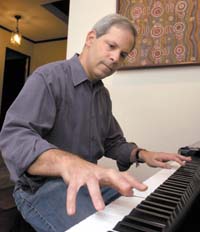
Born to boogie: Sirens Records founder
Steven Dolins. (Photo by Brian O¹Mahoney
/ Staff Photographer)
It might have been Pink Floyd, it might have been Led Zeppelin, it even might
have been -- oh, the horror -- Iggy and the Stooges.
As fate would have it, though, that day in 1969 or 1970 in Skokie, when impressionable
13-year-old Steven Dolins was raiding an older brother's record collection,
only one performer truly spoke to him: 1930s boogie-woogie piano great Pete
Johnson, playing "Roll 'Em, Pete."
"I heard that and I was hooked," said Dolins, founder of The Sirens Records,
dedicated to preserving authentic Chicago blues, boogie-woogie, gospel and
jazz.
(Of course, his appointment with destiny was greatly influenced by the fact
that the collection he was browsing belonged to big brother Barry, future founder
of the Chicago Blues Festival.)
Thirty-five years later, Dolins is releasing his 11th and 12th recordings on
The Sirens label: "Careless Love" by Chicago pianist Erwin Helfer
and "Heavenly Keys," featuring the three-part gospel keyboard stylings
of the Rev. Dwayne Mason, Leonard Maddox and Willie Jones.
The release party for both records is Friday night at Katerina's club and cafe
in Chicago. The Gospel Keyboard Trio also will perform two shows with jazz
vocalist Jimmy Scott Nov. 26 at the HotHouse in Chicago.
Dolins, now 48 and a longtime Highland Park resident, fell so hard for piano
boogie that he learned everything he could about it -- involving many trips
from his Skokie home to the Jazz Record Mart in Chicago and as many performances
as he could find.
Soon, just listening wasn't enough. He decided to learn to play and was fortunate
enough to find a great teacher: the aforementioned Mr. Helfer. Dolins, who
had collected his recordings and seen him perform at a University of Chicago
folk festival, simply called him up and asked for lessons.
Making tracks
Looking back on that time, Dolins recalls himself as a shy sort of kid -- but
apparently not when it came to pursuing his great passion.
In 1975, a few years after Helfer took him on as a student, the Niles North
High School student founded The Sirens label to reissue Helfer's own self-released
late-'50s compilation of boogie keyboard greats, "Primitive Piano."
A year later, he also recorded "Heavy Timbre," a meeting of Chicago
boogie piano greats Willie Mabon, Sunnyland Slim, Jimmy Walker, Blind John
Davis and Helfer.
"
Nobody else was recording these guys and I wanted to preserve that music," Dolins
said. "I think Erwin was into preserving it too, that's why he introduced
me to everyone."
Today, the 69-year-old Helfer is the only performer from the "Heavy Timbre" sessions
who is still alive.
After starting a record label as a teen, Dolins studied computer science at
Tulane University (where he could also spend four years listening to New Orleans
piano greats). He pursued a career as a programming researcher before taking
a job as a professor at Bradley University -- a job he still holds, commuting
to Peoria.
But in 2001, Dolins decided to revive The Sirens Records, reissuing "Heavy
Timbre." Dolins, who had enjoyed a long friendship with Blind John Davis
after making that record, wanted to his music alive.
"
It didn't seem fair to me that John never received wide recognition," Dolins
said. "He was an amazing piano player. He was the house pianist for all
the classic RCA Bluebird label recordings and he was one of the major players
who defined Chicago blues in the '30s and '40s."
Dolins is in the process of acquiring the rights to enough tracks by Davis
to produce a commemorative CD. In the meantime, he plans to record The Sirens
13th release live Jan. 29 when Chicago blues/jazz/gospel singer Katerine Davis
performs with Helfer's Chicago Boogie Ensemble at the Old Town School of Folk
Music.
Pre-'Sweet Home'
Most people immediately associate blues in Chicago with Willie Dixon and Muddy
Waters in the 1950s.
For Dolins, though, the scene goes back a few decades earlier, with players
like Jimmy Yancey, Cripple Clarence Lofton, Albert Ammons, Peter Johnson, Meade
Lux Lewis, Sunnyland Slim, Little Brother Montgomery, Otis Spann, Pinetop Smith,
Montana Taylor, Cow Cow Davenport playing rent parties with a supercharged
version of the blues -- eight beats to the bar instead of four -- that came
to be known as boogie-woogie.
The artists Dolins records, including Libertyville stride piano master Barrelhouse
Chuck, all spring directly from that pre-World War II Chicago blues tradition.
No less an authority than jazz writer Nat Hentoff, who produced records by
Otis Spann and Sunnyland Smith, has approved The Sirens' fidelity to that era
in a 2003 Wall Street Journal article.
"
All of my artists are the real deal," said Dolins, whose output in the
last five years includes another boogie piano summit ("Eight Hands on
88 Keys"), a solo and duet album by Helfer ("I'm Not Hungry but I
like to Eat -- BLUES!" and "St. James Infirmary"), a solo album
by Barrelhouse Chuck ("Prescription for the Blues"), an album of
gospel standards by the Reverend Dwayne R. Mason ("Glory! Glory!")
and a Chicago gospel piano summit ("In the Right Hands").
"
I'm pretty good myself and I've been playing for a long time but there are
people in Chicago right now who are the best in the world at playing this music," he
said.
"
Barrelhouse Chuck is carrying on the tradition of Sunnyland Slim. Erwin is
very friendly with Jimmy Yancey's wife and the last living link to the Yancey
family. And it turns out some of the best blues and boogie pianists today are
found among gospel players -- I don't see another generation of blues pianists
coming up. Most blues clubs don't even have pianos anymore."
"
It's kind of crazy because this isn't a financially sound thing to be doing
and I do it more or less all by myself," he said. "I'm the mail clerk,
the producer, the liner-notes writer, the marketing man. It takes a lot more
money and time than anyone would commit just for the sake of putting out some
CDs. But these artists -- Erwin, Chuck, Dwayne, all of them -- deserve to be
heard. They make great music and I want people to hear it and enjoy it as much
as I do."
Pioneer Press - "Piano blues key part of concerts"
by David Jakubiak October 26, 2006
For three decades, Highland Park's Steven Dolins has overseen the preservation of Chicago piano blues and boogie woogie as the head of The Sirens Records, a small independent label that's captured artists like Erwin Helfer, Sunnyland Slim, Detroit Junior and Pinetop Perkins.
But with the release of two new CDs, one featuring pianist Barrelhouse Chuck and the other singer Katherine Davis, Dolins is doing something new.
"The last two CDs I released have full bands, which is the first time I've done that. It was the first time I recorded a harmonica player," he said. "Prior to these CDs, I'd never even recorded a guitar player."
Revival
Dolins explained he had multiple reasons for making the change.
"In Chuck's case, it is the tradition he's keeping. Piano evolved from pre-war blues to being the main instrument played at house parties, to post-war blues, where pianists were part of the band, but not the main part," he said. "So what I'm trying to do with that CD is show how the piano became part of the modern Chicago blues sound.
"With Katherine Davis, a vocalist, she does some songs from the Bessie Smith era, and some straight Chicago blues. She deserves attention, and I wanted to give her that opportunity."
Interestingly, when Dolan first started recording the Blues as a college student in the 1970s, he was doing the exact opposite of what he's now doing.
"In many cases the guys I was recording had recorded with bands, but I really wanted to spotlight their piano playing."
That mission, he said, hasn't changed.
Key player
"I'm dedicated to piano music. I've recorded Gospel pianists and jazz pianists and blues pianists," he said.
He fully plans on continuing in this mission, he added.
"Unfortunately, I think it is a dying music. I'm interested in piano and Chicago has a whole long-standing tradition of piano from the pre-war all the way to now, and really only Erwin and Barrelhouse Chuck keep that tradition, which is why I'm trying to help those two gentlemen."
He hopes fans of good music will appreciate the sound as well, and that fans drawn to the label, as the name The Sirens suggests, will check out some of the earlier recordings.
"You're supposed to be taken with the music. You're not supposed to crash into the rocks, you're supposed to go out and buy the CD," he said, laughing.
Wall Street Journal - "Barrelhouse Chuck Goering Keeps
the Blues Alive"
By Nat Hentoff January 3, 2007
For two weeks, the children at the Braeside elementary school in Highland Park,
Ill., near Chicago, had been listening to Barrelhouse Chuck Goering play the
piano, sing and tell stories about historic blues masters he'd known. He'd come,
a teacher explained to the Chicago Tribune, "because we wanted to show the
kids the roots of American music." At one point, a 9-year-old said: "I
didn't know any of those famous names he talked about. It was like they were
keeping a secret from us." And another youngster, brand new to the blues,
added, "I really like the songs."
Those lively teaching moments took place three years ago, but Barrelhouse
Chuck -- still keeping the blues alive every way he can -- told me in December
that recently he'd been at another elementary school, in Rockford, Ill., when
a seven-year-old told him, "The notes you play on the piano sound so sad
to me."
"Well," he told her, "you feel a lot better when you play those notes.
That's what the blues is about, making you feel better to get them out."
Mr. Goering, born in French Canada and raised in Ohio, is, he notes, "50%
Cherokee." But since he first heard a recording by Muddy Waters when he
was nine years old, the blues became part of him. From his teens on, he worked
as a blues apprentice in largely black clubs in the South and then in Chicago,
learning from such classic mentors as Sunnyland Slim, Little Brother Montgomery,
Pinetop Perkins -- and Muddy Waters.
As he made the blues his own, Mr. Goering earned his professional name, Barrelhouse
Chuck. In Debra DeSalvo's invaluable book "The Language of the Blues" (Billboard
Books) -- based on interviews with many classic blues bards -- she explains: "A
bar where whisky is served straight from a barrel is called a barrelhouse.
The up-tempo blues that developed in these establishments came to be called
barrelhouse, and those blues sped up the dancing."
Listening often to 48-year-old Barrelhouse Chuck's CDs, "Got My Eyes
on You" and "Prescription for the Blues" (www.thesirensrecords.com;
also at Amazon.com), I want to dance, though I don't know any steps. And his
singing reminds me of stories jazzmen used to tell me about rambunctious rent
parties. But he can also make his "sad notes" tell the kinds of stories
that later became known as "soul music."
The Sirens label is a passionate avocation of Steven Dolins, a tenured professor
of computer science at Bradley University in Peoria, Ill. Like Barrelhouse
Chuck, Prof. Dolins has been drawn to the blues since he was very young, and
his way of helping keep the blues alive is through his record company.
In his notes for "Prescription for the Blues," Prof. Dolins tells
how Barrelhouse Chuck became so deeply steeped in the blues and -- as I've
found out, talking to Chuck -- such a vivid storyteller about the pantheon
of blues makers and shapers he's known off as well as on the stand. Writes
Prof. Dolins: "Chuck would show up at his heroes' gigs, sit in and socialize
with them. He not only trained with these musicians, he would also chauffeur
them, live with them and ultimately care for them. He became their family.
His recollection of special times with Little Brother and Sunnyland are vivid,
hilarious and at times bittersweet."
For example, I was telling Barrelhouse Chuck how moved I was by his singing
of the poignant "School Days" (on the "Got My Eyes on You" CD)
by Floyd Jones, one of the original Chicago bluesmen, who could be found on
Sunday mornings singing at the open-air Maxwell Street Market.
"I knew Floyd," Chuck told me. "I saw him just before he died
in the hospital. I held his hand, saw him in the casket and I buried him. But
his music stays with me."
Chuck believes that the blues he's lived can stay a living music if enough
young people, who can't have the mentors he did, can feel those sad and barrelhouse
notes. In the schools where he's told and played his stories, the children
encouraged him about the future because they clearly "do open up to the
blues."
Of his gig at the elementary school in Highland Park, Chuck recalls with pleasure
that he was very glad no one there "was trying to tell me about rap music
compared to the blues. The kids took it all in. It's like they weren't spoiled
by the garbage of today on the radio."
Those two weeks of blues at that school were generated by Prof. Dolins, whose
daughter was, at the time, in second grade there. He figured his daughter,
too, needed to be educated in this roots music. "At home she hears blues
all the time but mostly listens to Britney Spears."
There is a growing number of blues-in-the-schools programs around the country,
but Messrs. Dolins and Goering feel strongly that there ought to be many more.
Barrelhouse Chuck brightened when I told him that on Dec. 7, when the president
announced the recipients of the annual Presidential Medal of Freedom -- the
country's highest civilian award -- B.B. King, an American blues legend, was
on the list for his "distinguished service" to the nation -- and,
I would add, the world.
In 1999, jazz critic Peter Watrous wrote in the New York Times: "The
wells that gave rise to so much American music have seemingly dried up. Blues
culture is dead." But that same year, John Burnett of National Public
Radio reported from the Mississippi Delta, the deepest fount of black blues,
about a 64-year-old auto mechanic and blues guitarist, Johnnie Billington,
who'd become the Johnny Appleseed of the blues in the area's schools. At the
Rosa Fort Middle School, he had put together a blues band; and as the youngsters
played a slow blues, Mr. Billington pointed to a kid: "You see! He's feeling
it, see!"
Barrelhouse Chuck tells me he'll accept any invitations he gets to go into
classrooms. "That's where the future of this music is." It's too
bad that Clear Channel and other corporate radio chains and stations have no
playing time for Barrelhouse Chuck.
ABC 7 News - "An inspirational gospel pianist with a flare for jazz"
by Harry Porterfield - ABC 7 News February 8, 2007

Gospel music is Geraldine Gay-Hambric's first love. But don't be surprised if you hear a little jazz slipped into the music she plays. At 75-years-young this acclaimed pianist plans to keep playing and playing.
For more than 70 years the piano has been the other heart beat in her life. Even today, that hasn't changed. Geraldine is known for her jazz-influenced gospel sound. She learned in the beginning by watching her sister take lessons.
"I didn't learn. It was a gift. By me seeing my sister, I was carried away by her piano playing," the musician said.
With her late sisters, Evelyn and Mildred, she toured the country in the late1940's and early 1950'S. They appeared at New York's Apollo Theater, Carnegie Hall, the Astrodome and the Washington Mall, among other venues.
"My oldest sister, Evelyn, began to write our music," Geraldine said. "She would teach us the songs. After we would learn the song, she would say, 'Geraldine, you put the style and beat to it.'"
After her years of performing, Geraldine has never learned to read music.
"That's one thing I regret," she said. "Sometimes, I see people playing the piano and I've asked them, 'Could you teach me how to read music?' And they say, 'Geraldine, you don't want to play by music.' They say that I don't want to learn. Yes, I want to learn!"
Geraldine is the minister of music at her brother's church and plays there every Sunday. >> Geraldine Gay-Hambric: legendary gospel pianist, recording artist and someone you should know. ABC7 Chicago would like to thank the Olive Harvey College for supplying the venue for this story. The gospel concerts will continue there through the month of February.
That Old Time Religion
by Peter Margasak - Chicago Reader November 21, 2003
The Reverend Dwayne R. Mason says he was appreciative when Erwin Helfer came up to him after a 9/11 memorial performance last year and complimented his piano playing -- he'd accompanied a gospel choir -- but didn't think much about it. Helfer is one of the city's most knowledgeable and skilled students of prewar piano styles, and a compliment from him is nothing to sneeze at, but Mason didn't know who Helfer was. A month later Helfer called him at home; again he expressed his admiration and mentioned that he'd told Steven Dolins, who runs the Highland Park label the Sirens, about Mason and that Dolins might want to put out an album by him. "It was totally unexpected," says Mason, "but I didn't take it seriously." Dolins says he had to leave about six messages on Mason's answering machine over the next few months before they actually spoke.
Mason sees gospel as a calling, not a career. A licensed mortician who preaches regularly at his own church, he says he never spent time listening to other types of music, and though he's been playing piano all his life he'd never thought about making records. Dolins finally persuaded him to try, however, and this Sunday night Mason celebrates the release of his debut, Glory! Glory!, with a performance at the Old Town School of Folk Music. He'll play on a solo piano bill with Helfer, ragtime specialist Reginald Robinson, and jazz pianist Earma Thompson; for Mason, who turns 42 Friday, it'll be his first musical performance that's not connected with a religious service.
Most contemporary gospel recordings are slick affairs that borrow from current R & B and hip-hop styles. Glory! Glory!, on the other hand, is a delightful throwback to a time when gospel bore a closer likeness to its ancestors blues, ragtime, and early jazz. Thomas Dorsey, the father of gospel music, played raunchy blues under the name Georgia Tom before he applied a similarly rollicking style to religious songs. Mason usually performs on organ or electronic keyboard at church services, but on the album he plays a rich-sounding Baldwin grand piano; he's accompanied only by drummer Kendrick M. Jackson and Sydne Evans, who adds dynamic vocals on five tracks. He interprets 14 gospel classics, from warhorses like "Down by the Riverside" to traditional hymns like "Walk With Me, Lord" to 20th-century standards penned by the likes of Dorsey and the great singer Clara Ward. There are hints of Ray Charles-style soul on "Angels Keep Watching Over Me," jazz rhythms pulse through his take on "When the Saints Go Marching In," and a boogie-woogie bass line powers the ebullient "I'll Fly Away." Mason says he picked up all these nuances in church. "For me, it's in my blood," he says, "totally natural."
Mason grew up in the apartment of his grandmother, Doris King, in the Dearborn Homes projects near the IIT campus. King had bought a piano for Dwayne's mother, Roberta Mason, who reluctantly took lessons when she was younger, but it had been sitting idle since long before Dwayne was born. Mason says he messed around on the piano constantly, stopping only when the adults couldn't stand the racket any longer. A deeply religious woman, King regularly brought him with her to church, and when he could get away with it he'd bang away on the piano there too.
Mason says that when he was six his pastor, Frances Davis, told King that God was using music to come into his life, and she blessed and anointed him. Immediately afterward, he says, he was able to play all the way through a song for the first time. The church paid for his lessons with private teachers and at downtown piano stores like Lyon & Healy and Wurlitzer. Mason learned the basics this way, but he hated the rigidity of formal training. He says he learned more from soaking up the sounds every week in church, and he routinely gospelized the songs his teachers wanted him to play. Finally, as he recounts in the liner notes for Glory! Glory!, an instructor named Daisy Robinson told King that Mason didn't need any more lessons, but just needed to practice: "The music is already in Dwayne -- we can't teach him -- we will only distort what God is doing with him."
When Mason was ten his grandmother began to preach at various south-side churches, and he accompanied her on the keyboard; he'd provide largely improvised backing for the sermon, responding to the peaks and valleys of King's delivery and the outbursts of the congregation, and play rousing gospel numbers with the choir and with individual singers. He played like this for the next 20 years behind a number of ministers, primarily Richard D. Henton in the 70s and E.R. Allen in the 80s, with whom he appeared Sunday nights on local television. For much of the decade Allen and Mason also toured regularly in the south and on the west coast. During this time Mason started preaching too from time to time, and Allen encouraged him. She ordained him in the ministry in 1981, but he wasn't moved to preach regularly until 1990, when he presided over a cousin's funeral. Afterward, he says, "I heard something that ministers never hear: `Why didn't you preach longer? We were mesmerized by what you were saying.' That really stuck with me." He decided to launch Body Soul & Spirit Ministries that year, offering Bible classes in a room he rented from a now defunct church at 63rd and King Drive. By year's end he was holding services every Monday night.
In 1991 Mason got his own storefront space but couldn't keep up with rent payments, so the next year he converted the basement of his mother's Gresham home (where he'd been living since he was 17) into a chapel. Leading his flock -- which at this time had roughly 35 to 40 members, about half the current total -- left him little time to earn money as a musician. "I really thought that I was going to put music on the back burner and do my ministry full-time," he says. "I didn't get as many musical gigs, so I needed to have something to support myself." So in 1995 he enrolled in a two-year mortuary science program at Malcolm X College.
Mason found the more reliable income he was looking for in freelance funeral work, and he says his unusually broad set of skills has only helped: "My friends tease me, `Oh, he'll do it all. He'll marry you, he'll bury you, he'll embalm you, he'll play the piano for you, he'll preach for you, he'll do the whole shebang.'" By 1998 he was able to rent the space at 9118 S. Ashland that's the current home of Body Soul & Spirit. His work as a funeral director and biweekly church services have taken precedence over music since then, but making Glory! Glory! has revived his interest in playing, and after years of accompanying others he's pleased to be getting some recognition as a pianist. "I've planted those seeds down through the years," Mason says, "and God has allowed me to reap the harvest."
Helfer's boogie-woogie piano style still spilling out,
'totally off the cuff
by Howard Reich - Chicago Tribune February
29, 2008
Ask Chicago pianist Erwin Helfer what he's going to play during a rare solo show Saturday at the Skokie Theatre, and he can't answer.
"I don't know -- I just play, it's totally off the cuff," says Helfer, who has applied the same blithely unscripted approach to his career.
Though Helfer never intended to become a performing musician, the 72-year-old virtuoso long ago emerged as one of America's most effective interpreters of vintage boogie, blues and jazz.
"I never expected to become a professional musician -- I expected to become a piano teacher," says Helfer. "But I started getting some chops," and engagements began coming his way.
So have mountains of critical praise.
"Erwin Helfer stands out among a dwindling number of practitioners of boogie-woogie piano as he carries on a Chicago barrelhouse tradition," wrote Jon Andrews in DownBeat, in 2006.
"Longtime admirers of Chicago-based boogie-woogie pianist Erwin Helfer know what to expect: impeccably executed reprises of vintage-era standards, interspersed with a few originals," observed David Whiteis in Living Blues, in 2005.
In essence, Helfer performs with a degree of care and authenticity one sooner expects to encounter from a classical pianist. Yet he also captures the breezily improvisational spirit required for vintage boogie, jazz and blues -- the sense that the musician is making it all up on the spot.
Helfer came by these skills in unlikely fashion. Certainly there weren't many other white teenagers devouring age-old African-American music when Helfer was a student at New Trier High School, in the early 1950s.
"Somehow, I heard some old boogie and blues and some New Orleans jazz and I thought, 'Jeez, that's what I want to do,'" remembers Helfer.
So he began teaching himself piano and venturing to South Side clubs, soon befriending seminal New Orleans expatriate drummer Baby Dodds and revered jazz historian William Russell.
At the same time, though, Helfer deepened his education by earning degrees from the American Conservatory of Music and Northeastern Illinois University.
He went further still in his musical investigations, living in New Orleans for years, "to hear the New Orleans street parades" and otherwise immerse himself in the city's cultural traditions.
Add to this Helfer's decades of collaborating with Chicago's blues and jazz masters, such as vocalist Mama Yancey, and the man stands as a kind of living repository of nearly vanished musical traditions.
His efforts have not made him rich, but between performing live and teaching students privately, he has managed to spend a life in music. And thanks to his former student Steven Dolins, whose Sirens Records label has documented Helfer's work on CD, the pianist can point to an impressive discography.
As for the Skokie Theatre solo show, Helfer may not be willing to predict the repertoire, but a few tunes seem likely to turn up. He often performs "Do You Know What It Means to Miss New Orleans?"; Fats Waller classics such as "Ain't Misbehavin'" and "Honeysuckle Rose"; and the venerable "Swanee River," often dispensed in a rip-roaring boogie style.
"What I do is I grab pieces that appeal to me, that fit my own style," says Helfer.
"A lot of people can just play anything, and I'm not one -- I have to play things that I can get some soul out of."
Earma Thompson Honored
ChicagoJazz.com September 16 2008
Link to the original article »
Earma Thompson is being honored with the 2008 Captain Walter Dyett Lifetime Achievement Award by the Jazz Institute of Chicago. Eddie Johnson, long-time tenor sax player from Chicago, is the other 2008 recipient of this award. Earma Thompson attended DuSable High School in Chicago, where she was classmates and friends with Dorothy Donegan, Johnny Hartman, Von Freeman, and many other musicians who created the vibrant Chicago jazz scene. Through her marriage to drummer Marshall Thompson, Earma befriended and often accompanied the dominant Chicago jazz musician's of the past fifty years. Despite being recognized by other musicians, Earma's graciousness and humility have kept her from achieving the wider recognition she deserves.
Earma Thompson studied piano with Mabel Sanford Lewis, organist and pianist at Ebenezer Baptist Church, at 8 or 9. Earma played at Sunday school and Junior Church. Much later in life, Earma discovered that Ms. Lewis also taught John Young, another talented Chicago jazz pianist, at an early age.
It's fitting that Earma Thompson receive the Captain Walter Dyett Lifetime Achievement Award since she attended DuSable High School where Walter Dyett was the famed band leader and music teacher. Earma graduated in 1939, a year early due to taking extra classes. Looking back at high school, Earma said Captain Dyett was a mentor and disciplinarian. She said, "Some of them [students], they really needed what he had to give them. And looking back they knew it too now, you know. Because you had people like Gene Ammons, he was in there. Johnny Griffin. They were in the band. Jimmy and his brother Morris Ellis. Von and George Freeman. He had some great people and he helped them realize their potential cause like I said he didn't take no foolishness you know. He got down to business and give you work. I'm sure everyone benefited that knew him. Looking back, they all realize it now. They thought he was sort of tough."
Although, Earma played piano, she was never in Walter Dyett's famed band. However, she worked with Captain Dyett during rehearsals for the Hi-Jinks, DuSable's annual musical show. Earma sang in the special voice choir under the direction of Mildred Bryant Jones. The same choir that Johnny Hartman was in. Although Earma's connection to Captain Dyett was through the Hi-Jinks, she said, "He'd see us every day. During the school, down the hall, going in the band room sometime when they weren't rehearsing. We all knew each other. That's what was so nice about that school."
The Hi-Jinks was an event that showcased the incredible talent at DuSable. It also provided students with opportunities to be discovered. A lot of students left school early and joined bands; Earma talks about Johnny Hartman and Johnny Griffin leaving school early to join bands.
After high school, Earma studied classical piano at Herzl Junior College, on Chicago's west side, and the Chicago College of Music, at Jackson and Wabash, upstairs from Lyon & Healey.
It wasn't until after Earma met Marshall Thompson, her future husband, that she started to play jazz. Although Marshall attended DuSable, they did not really know each other during high school. They met each other because they lived near each other on South Michigan Avenue; Earma lived at 4450 S. Michigan and Marshall at 4441 S. Michigan. She explains how she met Marshall and interestingly enough, also how she got introduced to jazz, "So one day Eddie [Marshall's brother and trumpet player], Marshall, and Lank Keys [tenor player and later an arranger for Billy Eckstine's band] … come by together by the house just to say hello and I was on my porch. They just stopped. They was talking. And then Eddie, Marshall's brother, says you ought to hear her play the piano, she plays real good, and Marshall's says yea. He [Lank] told me where he worked 43rd street which wasn't too far. He said come by tomorrow night and come sit in with us. I said, Sit in with you? Yea, he said all you have to do is comp. And I said I don't know the songs you all play. So he said you know "Blue Skies". I said yea, well he said play that. He said just comp and I didn't know what that meant. You know what it means to say comp don't ya?
I didn't, I say comp? So he said yea. He said where do you live and I said right there. He said I'd come by your house tomorrow and show you how to comp. And then come by and sit in with us. And Marshall was with them. I probably didn't say okay, I probably looked at them with my eyes coming out of my head. Oh, the next day I was sitting on the porch and Marshall come by hisself and looked at me so we spoke and he said did you learn how to comp? And I said what is he talking about. I said what? [thinking to herself] I thought Lank Keys said he was going to come by and teach you how to comp. [telling us what Marshall said] I said I didn't see him. So anyway, we started talking like that and he said you want to go to the show. And I don't know who was there, they had stage shows at the Regal just about every week. I said I don't care. That's the way we got started."
During the 1940's, Marshall had an act with Clarence Allen, called Peck and Peck. They toured and performed music, dance, and comedy prior to big band performances by Duke Ellington and Erskine Hawkins. It's thrilling to hear Earma talk about seeing Avery Parrish, pianist for Erskine Hawkins, perform "After Hours" sitting backwards on the piano stool. After Peck and Peck broke up in 1950, Clarence Allen moved to California where he still lives today, Marshall started playing drums in a band with his brothers, William, a pianist, and Eddie Jr., on trumpet. Once they started getting gigs, they'd encourage Earma to play with them. Earma reminisced, "You know how I am; they had to really beg me."
Earma did not play jazz professionally until after she married. She initially learned jazz by listening to other musicians, listening to records, and also from learning new tunes from sheet music. She accompanied Joe Williams at the Cotton Club, prior to Williams joining Count Basie's orchestra, and Billie Holliday at Partners at 58th and Prairie in a basement.
Earma's piano playing swings but she also has bebop chops. She credits Clifford Jordan and John Gilmore for helping her make the transition from swing to bebop: "When I got to the Cotton Club and met John Gilmore, and Clifford Jordan, and all that bunch, and Tom Archie. Tom Archie [tenor sax player], he comes from Texas. He was very good. Most of those cats had bad habits. Tom Archie drank like mad but he could play. … They [Gilmore and Jordan] took me under their wings. Showing me this and helping me cause they saw I wanted to learn, and what they showed me I applied in my playing and for them it was a thrill. They appreciated it, whatever they told me maybe the next night when I come back out and play it so they were very, very, very nice to me. John Gilmore played tenor with Sun Ra and Clifford played tenor too. I know Clifford died up in New York. Clifford got in trouble. Most of those cats messed around. I never heard nobody say anything about John Gilmore. He loved Sun Ra. In fact he turned out to be Sun Ra's assistant in the band. He's gone too. I had a lot of fun with them and they were very, very nice to me. When I think back, I think they appreciated me trying to do what they told me. I listened to what they told me and so that way they always had something to tell me. "Try this chord here" or "don't play that chord there" and I was doing all of that. I'm glad I met them. I got in their way and they got in my way."
Later in Earma's career, Penny Tyler asked Earma to play at Andy's, and Earma played there for many years with Sonny Seals and John Watson. In more recent years, Earma plays with Juli Wood, or John Brumbach, or Ray Bailey, or Teddy Thompson at various venues like Katerina's. After Marian McPartland heard Earma's solo recording "Just in Time" on The Sirens Records (www.thesirensrecords.com), she said it was the best example of bebop piano she's heard in many years and invited Earma on her National Public Radio program "Piano Jazz" in 2004. In the last few years Earma has also recorded "Blues for Earma Jean" with Juli Wood, Dennis Carroll, and Mike Schlick and "Madam Queen" with Ari Brown, John Brumbach, William "Bugs" Cochran, and Yosef Ben Israel for The Sirens Records (reviewed in the July 2008 issue of DownBeat).
Earma Thompson has played jazz professionally in Chicago for fifty-eight years. She knew, knows, and has played with every great jazz musician from Chicago. Some of those musicians' moved on to achieve stardom but Earma was always satisfied being supportive in the rhythm section and not drawing attention to herself. Earma Thompson justifiably deserves the 2008 Captain Walter Dyett Lifetime Achievement Award.
Steven Dolins is an Associate Professor in the Department of Computer Science at Bradley University and President of The Sirens Records, a music label dedicated to preserving Chicago blues, jazz, and gospel piano.
Other news releases:
Kimberly Gordon recently recorded at Victorian Recording studio with Chris Foreman and Andy Brown. A fall release is planned on The Sirens Records.
Barrelhouse Chuck recently participated in recording a soundtrack for "Cadillac Records", a movie about Chicago's Chess Records. Adrian Brody stars as Leonard Chess, Beyonce as Etta James, and Cedric The Entertainer as Willie Dixon. Bruce Springsteen and Marshall Chess visited the studio during the recording session.
Chief Executive Philanthropist - Dr. Dolins and The Sirens Records
Bradley University March 1, 2009
Link to the original article »
In this day and age, it is unlikely to find a private, for-profit business where the sole goal is philanthropy. There is a reason we never hear of a Chief Executive Philanthropist. Nonetheless, at least one man at Bradley can claim that title. Bradley's Dr. Steven Dolins of The Sirens Records (thesirensrecords.com) is a mark of that anomaly. Through his record label, Dolins has succeeded in fulfilling a life-long, selfless goal. Dolins' initial goal at 19 to record his boogie woogie piano mentor has evolved into preserving the lineage and voice of Chicago boogie woogie, jazz, and gospel piano.
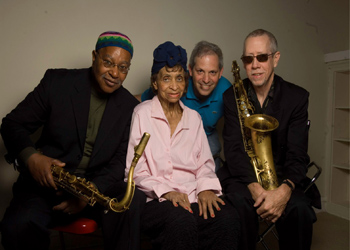
From left to right: Ari Brown, Earma Thompson, Steven Dolins, and John Brumbach. Photo by Paul Natkin.
For the last couple decades, Dr. Dolins has continued to keep alive the vision he began when he helped record Erwin Helfer, John Davis, Sunnyland Slim, Willie Mabon, and Jimmy Walker in 1976. After producing his first record in his late teens, Dolins went on to earn his Ph.D. in computer science at The University of Texas-Arlington. However, don't let his background in data mining and data warehousing confuse you. When asked what effect his degree has on The Sirens Records, there is a disconnect and Dolins shakes his head. To him the two areas of his life are incompatible. In fact, his degree and work as a professor in the Computer Science Department have little to do with his record producing. Dolins is a man wearing two hats; by day he instructs computer science students, but by night he is immersed in the music scene. Oftentimes, his contributions to the Bradley campus resemble those of a music, theatre, or studio arts professor rather than of a computer science professor, for Dolins also works to bring Chicago folk sounds to the University and the Peoria community. Recently, through a grant co-written with Dr. Derek Montgomery, Dolins brought 85-year-old bebop jazz pianist Earma Thompson to campus (possibly the last professional engagement for the Jazz Institute of Chicago Lifetime Achievement Award winner). Dolins also plans to bring Kimberly Gordon, Chris Foreman, and Andy Brown to campus this fall. In the past few years, with the help of ICAC, Erwin Helfer, Barrelhouse Chuck, Detroit Jr., Katherine Davis, and Donald and Geraldine Gay have performed on campus. In addition to the performances, students were given an opportunity to interview the musicians as part of an Honors class taught by Dolins on the “History of the Blues” these interviews are archived at the Bradley library. He has also taught a class on the History of Chicago Blues to retired learners at Bradley.
The preservation of American folk music is not uncommon or trivial nor has the importance of Dolins' contribution to cultural preservation gone unnoticed. Famous music critic, Nat Hentoff, of the Wall Street Journal, notes the achievement of Dolins and his record label in the January 8, 2003 article titled “The Bards Who Keep a Tradition Alive.” Hentoff writes, “Steve Dolins is a blues man and, like the other insistent amateursbefore him, he is sharing his love of the music with a growing number of fortunate listeners.” Although Hentoff classifies Dolins as an “insistent amateur,” he compares him to legendary producers, who all began as merely “enthusiasts.” Maturing from Dolins' enthusiasm is a bona fide record label archiving the cultural sounds of Chicago. As the labels exposure has grown, The Sirens Records has been featured on NPR's All Things Considered, Fresh Air, and Piano Jazz.

Dr. Dolins at the piano. Photo by Brian O'Mahoney
Contrary to what his mention in the Wall Street Journal would suggest, The Sirens Records is a financial burden for Dolins. Like Dolins' trials in today's business world, the original trips through the hills of the American South to record folk voices did not come without tribulation. Since the beginning of the 20th century, archivists, collectors, and producers have set out to capture the folk spirituals, jigs, and hymns that nestle into the hills of Appalachia, yet the road traveled to collect and preserve these voices is never effortless. Burkhard Bilger describes it best in his article “The Last Verse” for The New Yorker, “The trip was often a torture to him [the music archivist]: he collected in the heat of summer, traveling on foot and horseback, by bicycle and motorcar, pack mule, punt and aptly named jolt wagon.” Dolins does not have to go farther than Chicago to find voices he feels a need to preserve, but the road is not without hardship. Nonetheless, Dolins recognizes that these voices are integral to American culture, and that is why he is willing to preserve these strands of culture for others at any cost. Although the musicians of Chicago boogie woogie, jazz, and gospel will whither and fade, their voices will stay alive on The Sirens Records. Dolins is investing in the future of music and art in American folk sounds in the same way the songs excavated from the hills became fodder for Bob Dylan, Woody Guthrie, and other American musicians.
Memories of Geraldine Gay - A Legendary Gospel Music Pianist
by Steven B. Dolins April, 2010
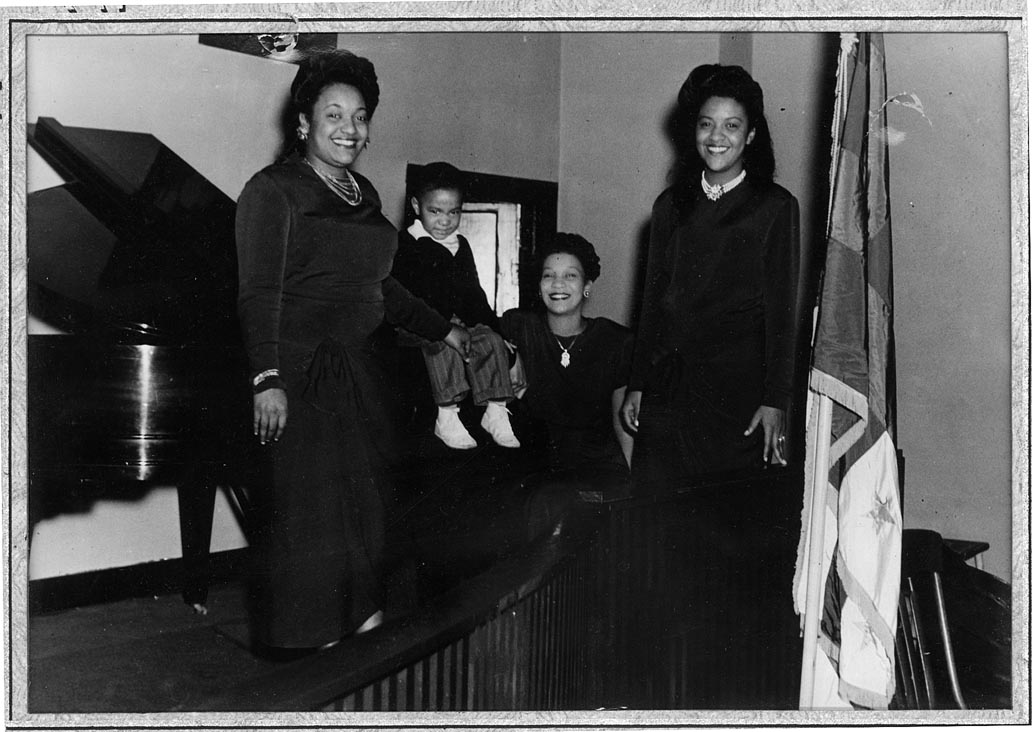
Gay's family in 1950s: Gay Sisters Trio and the young brother Donald on the piano.
Geraldine Gay passed away April 6th, 2010. She was a gospel legend. In 1950, the Gay Sisters Trio, including Geraldine, recorded one of their hit songs “God Will Take Care of You” for Savoy. They also recorded for Dolphin and Chess Records. Fortunately, The Sirens was able to record Geraldine and her brother Pastor Donald Gay on two recent CDs: “In the Right Hands – Chicago Gospel Keyboard Pioneers” and “Soulful Sounds”.
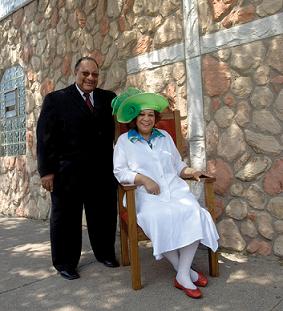
Geraldine Gay and her brother Pastor Donald Gay posted for a photo at their church in 2008.
Geraldine was a brilliant musician and loyal friend with a great sense of humor and style.
Geraldine was called the “Erroll Garner of Gospel Piano” but she had a style all her own. Gospel music fans around the world will remember and appreciate Geraldine Gay and her contributions to the music she dearly loved.
The Sirens would like to extend our deepest sympathies to the Hambric and Gay families.
